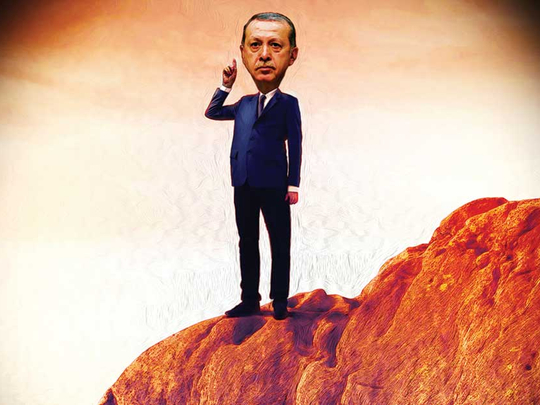
In the beginning, nearly 14 years ago, Recep Tayyip Erdogan chose a team of smart and qualified people to run Turkey with him. He now appears set to force out one of the last of that group — Prime Minister Ahmet Davutoglu — and replace him with someone more pliant. This is disastrous for Turkey, as financial markets have recognised.
To know why, look at the issues over which Erdogan and Davutoglu — who is no rebel or hero of a Turkish secular democracy — have sparred, fraying what was once the tightest and subservient of political relationships to breaking point.
The earliest split came soon after Davutoglu’s appointment as Prime Minister, when he proposed an anti-corruption package in response to allegations of corruption made against Erdogan’s family and closest political allies. Erdogan said the idea was premature and it was dropped.
Davutoglu was keen to preserve a measure of market confidence in the independence of Turkey’s Central Bank, protecting it from Erdogan’s curious beliefs about monetary policy (he has said that higher interest rates promote inflation, a theory refuted by several centuries of economic theory and empirical data). When a new central bank governor was to be appointed last month, Erdogan wanted someone more responsive to his demands for lower rates.
Davutoglu has also been marginally less hawkish on the destructive war with militants from Turkey’s large Kurdish minority, which was rekindled last year. He spoke out in support of hundreds of academics, who were arrested under anti-terrorism laws for writing a public letter critical of Erdogan’s Kurdish policies.
And although publicly supportive of Erdogan’s plans to rewrite Turkey’s constitution to transfer virtually all powers to the presidency, Davutoglu’s actions in trying to consolidate his own power base have given Erdogan cause to believe he is insincere. Indeed, there is no intellectually honest argument to make that a presidential system, which hands virtually unchecked power to someone already subverting Turkish institutions, from the judiciary to the media, to his control would be good for Turkish democracy. For that reason, most Turks — meaning many of Erdogan’s voters, too — oppose the change.
The final straw appears to have come with Davutoglu’s push to negotiate a deal with the European Union (EU) to accept refugees back from Greece, in exchange for $6 billion (Dh22 billion) and a visa-free travel regime for Turks. Erdogan appeared luke-warm towards the deal, which still faces hurdles in the EU. It requires Turkey to adopt a number of policy changes, including on restraining its rampant abuse of anti-terrorist legislation, in exchange for visa-free travel to the EU — a move that would be enormously popular among Turks. In other words, it would constrain Erdogan’s freedom of action and provide the EU with leverage.
Worse, the EU was clearly happier to deal with Davutoglu than Erdogan (read the leaked transcript of a meeting between the Turkish and European Commission presidents to see why). Davutoglu, for his part, made sure Turks saw the deal as his personal success. The talk at which Erdogan and Davutoglu discussed his future came on Wednesday night, hours after the European Commission recommended a green light to give Turks visa-free travel.
Which brings us back to the beginning, when the then prime minister Erdogan and his ruling party were by any objective measure good for Turkey. He had Abdullah Gul as a partner, who would later become president. Ali Babacan and Mehmet Simsek, both well-qualified and trusted by foreign investors, ran the economy. Ertugrul Gunay, a liberal and former member of the secularist Republican People’s Party, headed the sensitive Ministry for Culture and Tourism. In parliament, Justice and Development Party MPs included a significant number of secular liberals. And when Gul became the president, Erdogan picked an academic, Davutoglu to run foreign policy.
Of that team, only Simsek would remain in place once Davutoglu is gone. In parliament, the party’s MPs have all been hand-picked by Erdogan. With an Erdogan lackey as prime minister, Simsek’s freedom to protect Turkey’s $720 billion economy from political damage will narrow further. The new central bank governor will also be exposed to greater political pressure.
Davutoglu suffered from hubris and an excess of ideology as foreign minister. But his fundamental idea — to rebalance Turkey’s foreign affairs from a singular focus and dependence on the West, towards Turkey’s former Ottoman possessions in the Middle East, the Caucasus and the Balkans — was right.
As Prime Minister, too, Davutoglu has offered a cautious counterweight to an increasingly radical president, who continuously defines himself against western values and goals. By replacing his hand-picked prime minister with someone still more subservient, Erdogan will get the effects of a presidential constitution even if he cannot succeed in rewriting it. And one of the last shreds of balance in Turkey’s political life will disappear for the foreseeable future.
— Bloomberg
Marc Champion writes editorials on international affairs for Bloomberg View.












